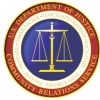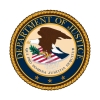Our Components
Explore the Department’s more than 40 components. Several organizations have offices throughout the country, including the Antitrust Division, the Federal Bureau of Prisons, the U.S. Trustee Program, the Executive Office for Immigration Review, the Environment and Natural Resources Division, and the Bureau of Alcohol, Tobacco, Firearms and Explosives. The 94 U.S. Attorneys’ Offices are organized into districts and located in every state and territory. More information about Justice field-office locations employing attorneys is available on the DOJ Offices by State Chart.
Click on each component to learn more about available opportunities.
The Antitrust Division's mission is to promote competition in the US economy through enforcement of, improvements to, and education about antitrust laws and principles.
ATF protects the public from crimes involving firearms, explosives, arson, and the diversion of alcohol and tobacco products; regulates lawful commerce in firearms and explosives; and provides worldwide support to law enforcement, public safety, and industry partners.

The Civil Division represents the US in any civil or criminal matter within its scope of responsibility – protecting the federal government, preserving the intent of Congress, and advancing the credibility of the government.

The Civil Rights Division enforces the laws prohibiting discrimination in education, employment, credit, housing, public accommodations and facilities, voting, and certain federally funded and conducted programs.

CRS serves as “America's Peacemaker”. CRS helps local communities address community conflicts and tensions arising from differences of race, color, and national origin. CRS also helps communities develop strategies to prevent and respond to violent hate crimes committed.

The Criminal Division's mission is to serve the public interest through the enforcement of criminal statutes in a vigorous, fair, and effective manner; and to exercise general supervision over the enforcement of all federal criminal laws.
DEA's mission is to enforce the controlled substances laws of the US and bring to the criminal/civil justice system those organizations, involved in the growing, manufacture, or distribution of controlled substances appearing in or destined for illicit traffic in the US; and to support non-enforcement programs aimed at reducing the availability of illicit controlled substances on the domestic and international markets.

ENRD's mission is to enforce the Nation’s civil and criminal environmental laws. ENRD's mission also involves the protection of the Nation’s natural and Tribal resources.

EOIR's primary mission is to adjudicate immigration cases by fairly, expeditiously, and uniformly interpreting and administering immigration laws. EOIR conducts immigration court proceedings, appellate reviews, and administrative hearings.
Provides executive and administrative support for the 93 United States Attorneys located throughout the 50 states, the District of Columbia, Guam, the Marianas Islands, Puerto Rico, and the U. S. Virgin Islands. Such support includes legal education, administrative oversight, technical support, and the creation of uniform policies, among other responsibilities.
The FBI's mission is to protect the American people and uphold the Constitution. FBI priorities are to protect the US from terrorist attack; protect the US against foreign intelligence, espionage, and cyber operations; criminal cyber activities, combat public corruption at all levels; protect civil rights; combat transnational criminal enterprises, combat white-collar and violent crime.
BOP protects public safety by ensuring that federal offenders serve their sentences of imprisonment in facilities that are safe, humane, cost-efficient, and appropriately secure, and provide reentry programming to ensure their successful return to the community.
FCSC Adjudicates claims of U.S. nationals against foreign governments, under specific jurisdiction conferred by Congress, pursuant to international claims settlement agreements, or at the request of the Secretary of State.
INTERPOL Washington's mission is to facilitate international law enforcement cooperation as the United States representative to INTERPOL on behalf of the Attorney General.
JMD serves as the management arm of the Department of Justice, advising the Attorney General and Deputy Attorney General on various issues related to the operation of the Department.
NSD's mission is to protect the United States from threats to our national security by pursuing justice through the law.
The Office for Access to Justice works to break down barriers to the founding principle and enduring promise of the Department of Justice: equal justice under law. Our mission is to ensure access to the promises and protections of our civil and criminal legal systems for all communities.
The mission of the Office of Information Policy (OIP) is to encourage and oversee agency compliance with the Freedom of Information Act (FOIA). OIP is responsible for developing government-wide policy guidance on all aspects of FOIA administration.
OJP’s mission is to increase public safety and improve the fair administration of justice across America through innovative leadership and programs.
OLC provides legal advice to the President and all executive branch agencies. The Office drafts legal opinions and other advice in response to requests from the Counsel to the President, the various agencies of the Executive Branch, and other components.
OLP's mission is to develop and implement the Department's significant policy initiatives, handle special projects that implicate the interests of components, coordinate with other interested components and serve as the primary policy advisor to the Attorney General and the Deputy Attorney General.
The Office of Legislative Affairs (OLA) has responsibility for the development and implementation of strategies to advance the Department's legislative initiatives and other interests relating to Congress.
Office of Professional Responsibility's primary mission is to ensure that Department attorneys perform their duties in accordance with the high professional standards expected of the nation’s principal law enforcement agency.
The Office of Public Affairs is the principal point of contact for the Department of Justice with the news media. The Office is responsible for ensuring that the public is informed about the Department's activities and about the priorities and policies of the Attorney General and the President regarding law enforcement and legal affairs.
The Office of Tribal Justice is the primary point of contact for the Department of Justice with federally recognized Native American tribes, and advises the Department on legal and policy matters pertaining to Native Americans.
The Office of the Associate Attorney General advises and assists the Attorney General and the Deputy Attorney General in formulating and implementing Departmental policies and programs pertaining to a broad range of civil justice, federal and local law enforcement, and public safety matters.
The Attorney General represents the United States in legal matters generally and gives advice and opinions to the President and to the heads of the executive departments of the Government when so requested.
The Deputy Attorney General advises and assists the Attorney General in formulating and implementing Departmental policies and programs and in providing overall supervision and direction to all organizational units of the Department.
The Office of the Executive Secretariat (OES) is responsible for controlling and managing correspondence emanating to and from the Attorney General, Deputy Attorney General, Associate Attorney General, and specific Congressional and interagency correspondence. The Office also provides records management services to the three principal executive offices.
OIG promotes the rule of law through objective, independent oversight of the Department of Justice.
The Office of the Pardon Attorney assists the President in the exercise of executive clemency. Executive clemency may take several forms, including pardon, commutation of sentence, remission of fine or restitution, and reprieve.
The task of the Office of the Solicitor General (OSG) is to supervise and conduct government litigation in the United States Supreme Court.
The Office on Violence Against Women (OVW) provides federal leadership in developing the national capacity to reduce violence against women and administer justice for and strengthen services to victims of domestic violence, dating violence, sexual assault, and stalking.
The mission of the Professional Responsibility Advisory Office (PRAO) is to ensure prompt, consistent advice to Department attorneys and Assistant United States Attorneys with respect to professional responsibility and choice-of-law issues.
The Tax Division's mission is to enforce the nation's tax laws, fairly, and consistently, through both criminal and civil litigation, to promote voluntary compliance with the tax laws, maintain public confidence of the tax system
Charged with ensuring “that the laws be faithfully executed,” the 93 USAOs work to enforce federal laws throughout the country. The President appoints a US Attorney to each of the 93 federal districts.
The USMS’ mission is to enforce federal laws and provide support to virtually all elements of the justice system by providing for the security of court facilities and personnel; apprehending criminals; exercising custody of prisoners and providing for their security and transportation to correctional facilities; executing court orders; seizing assets; assuring the safety of endangered government witnesses and their families; and collecting funds.
USPC is responsible for overseeing the administration of bankruptcy cases and private trustees, We are a national program with broad administrative, regulatory, and litigation/enforcement authorities whose mission is to promote the integrity and efficiency of the bankruptcy system for the benefit of all stakeholders–debtors, creditors, and the public.
The mission of the United States Trustee Program is to promote the integrity and efficiency of the bankruptcy system for the benefit of all stakeholders – debtors, creditors, and the public.

